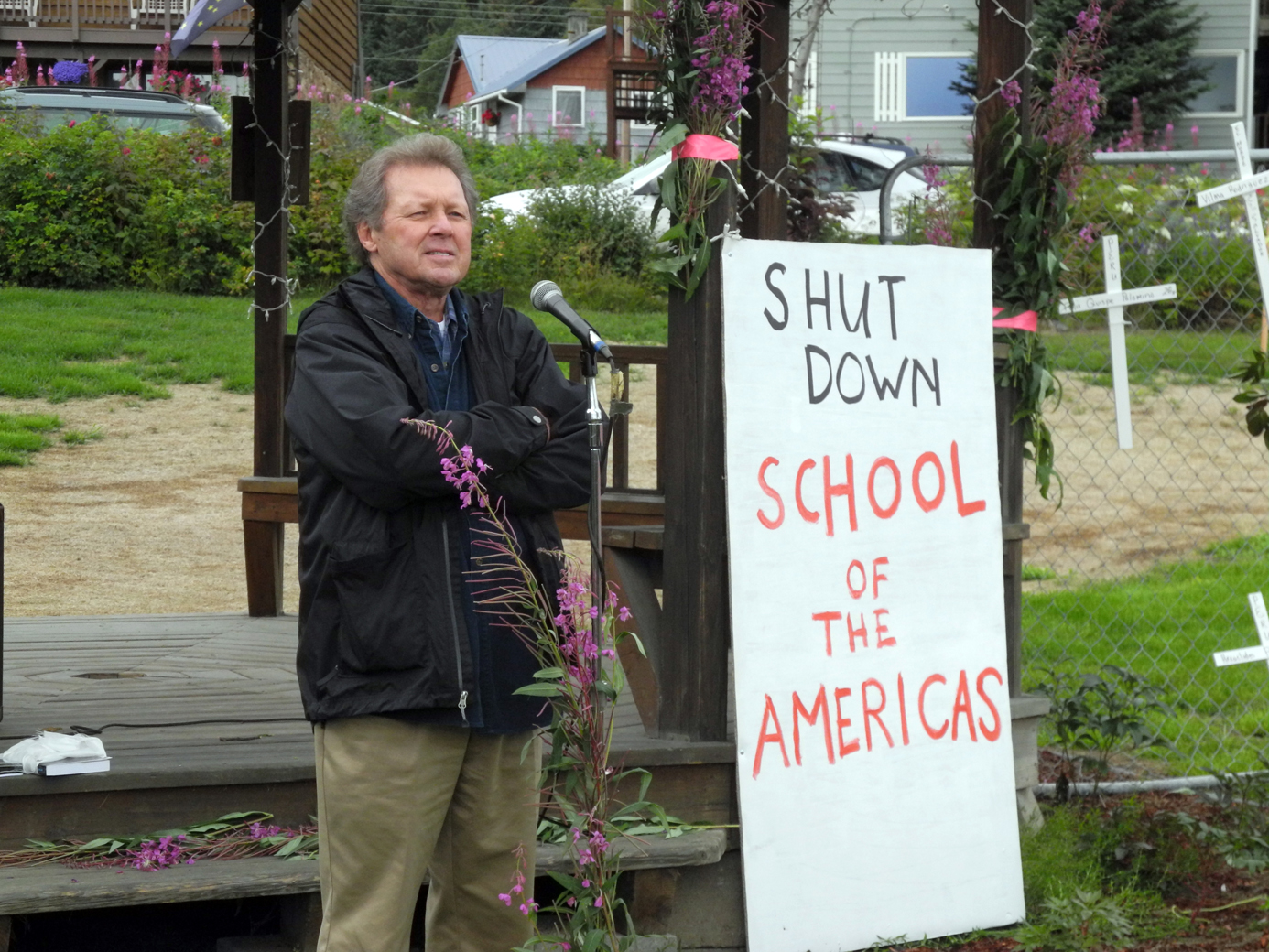On a drizzly Saturday afternoon at WKFL Park — a park donated to Homer by Brother Asaiah Bates, another combat veteran turned peace activist — Father Roy Bourgeois spoke quietly of his journey to social justice.
“I don’t know what can be more important than working for peace and justice,” he said.
Billed as a discussion of Bourgeois’ work against the School of the Americas, or SOA, a counter-insurgency program at Fort Benning, Ga., the talk really was about the former Maryknoll priest’s life.
Bourgeois, 75, founded and runs SOA Watch. He spoke of how he had grown up in Louisiana, going to segregated schools. After college, he joined the U.S. Navy and in 1965 volunteered for shore duty in Vietnam.
“I believed that great lie: ‘Our cause was noble. We are going to be the liberators,’ the same lie we heard in Iraq and Afghanistan,” he said.
In Vietnam, he became disillusioned and questioned not just the war, but war itself.
“I’d never seen so much violence,” he said. “I discovered we’re not made for war. We cannot go on with the business of killing.”
War, however, brought him closer to God, Bourgeois said. He met a priest running an orphanage, Father Lucien Olivier, who inspired him to become a priest.
“He was a healer, a true peacemaker,” Bourgeois said. “He was like Brother Asaiah in a sense.”
After his tour, Bourgeois entered the Maryknoll Missionary Order and six years later in 1973 became a priest. He went to the slums near La Paz, Bolivia, to work with the poor.
“It was here where the poor who I was there to serve became my teachers,” he said.
From the poor he learned the idea of solidarity, “to work with, to make the struggle of others your struggle,” Bourgeois said.
He became more active in politics, working with union organizers and others resisting the government of dictator General Hugo Banzer. Bourgeois was arrested and kicked out of the country.
Next he went to El Salvador. Two Maryknoll sisters and friends were raped and killed by soldiers there along with another nun and a Catholic lay worker. Salvadorian soldiers assassinated Archbishop Oscar Romero.
“It was the slaughter of the innocents,” Bourgeois said. “It was being done in our name and with our taxes.”
Bourgeois learned that many Latin American soldiers had been trained at the School of the Americas. He heard 525 Salvadorian soldiers would be training there. With other activists, he went to protest.
“We decided to go to Fort Benning and say, ‘Not in our name,’” Bourgeois said.
People held up small crosses with the names of people killed by School of the Americas trained soldiers. They gathered at the gate. Bourgeois and two others decided to commit civil disobedience. Dressing as high-ranking officers, they entered the base with a boom box and climbed a tree outside the barracks where the Salvadorian soldiers stayed. At night, they turned on the cassette player and played Archbishop Romero’s last sermon in which he urged soldiers to lay down their arms and disobey orders to kill.
“His voice boomed into the barracks. It was like poking a bee hive,” Bourgeois said.
Soldiers with M-16s and guard dogs surrounded them. Bourgeois was arrested and ultimately sentenced to 18 months in federal prison.
“In prison, we learned something important: the truth cannot be silenced,” he said. “Prison was the best spiritual retreat I had.”
After prison, Bourgeois founded SOA Watch. He learned more about the program that taught commando tactics, psychological operations and torture techniques. He began organizing annual protests outside the Fort Benning gates.
His social activism eventually led Bourgeois to question the idea of male-only priesthood. He met Catholic women called by God to the priesthood. Bourgeois said he had been told the call for male priests came from God.
“Who are we as men to say our call to the priesthood is authentic but yours as women is not?” he asked. “I could not be quiet. I had to speak out.”
The Vatican tried to silence him, saying that his advocacy for women priests created a scandal, which Bourgeois found ironic. When Catholics think of scandal, “They think of the thousands of children abused by priests,” he said.
Last November, the Vatican expelled him from the priesthood.
“It’s like going through a painful divorce,” he said.
Bourgeois still works for justice.
“These movements are unstoppable simply because they are rooted in love,” he said. “We have work to do. We can all do something.”
Michael Armstrong can be reached at michael.
armstrong@homernews.com.


